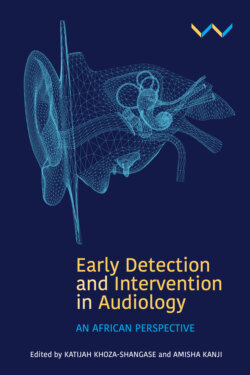Читать книгу Early Detection and Intervention in Audiology - Группа авторов - Страница 34
На сайте Литреса книга снята с продажи.
EHDI contextualised
ОглавлениеIn order to minimise hearing impairment consequences, and improve the quality of life of children with hearing impairment, EHDI is key in order to capitalise on the childs' period of maximal brain plasticity (Fulcher, Purcell, Baker, & Munro, 2015; HPCSA, 2018; Hutt & Rhodes, 2008; JCIH, 2007; Northern & Downs, 1991; WHO, 2018).
Globally, the JCIH, and locally, the HPCSA, advocate for culturally sensitive and contextually relevant EHDI to counter the negative consequences associated with hearing impairment (HPCSA, 2007, 2018; JCIH, 2000, 2007, 2013, 2019). Timeous intervention has been found to have similar communication outcomes for hearing-impaired individuals when compared with their non-hearing-impaired counterparts (Mehl & Thomson, 2002; Meyer, Swanepoel, & Le Roux, 2014; Moeller, 2000; Olusanya, 2005). Thus, the JCIH and HPCSA specify EHDI goals to include maximising outcomes pertaining to linguistic competence, literacy development and education while acknowledging cultural congruency (HPCSA, 2007, 2018; JCIH, 2000, 2007, 2013, 2019).
In order for EHDI to be successful, hearing screening, confirmation of hearing impairment through diagnostic assessment and appropriate intervention must be in place. The HPCSA (2018) further highlights the need for sustained surveillance of infants and toddlers, protection of infants and families, as well as adequate information infrastructure and quality monitoring. These components of EHDI not only emphasise timeous identification, intervention and programme sustainability to maximise communication outcomes (Harrington, Desjardin, & Shea, 2009; Yoshinaga-Itano, 2013), but also define early intervention as a primary determinant of a childs' success in the wider world. Chapter 2 considers early hearing detection in sub-Saharan Africa, with a discussion of principles related to early detection of hearing impairment as outlined by the HPCSA (2018) guidelines.
To further contextualise early hearing detection, it is necessary to unpack EHDI timelines. International gold standards, defined as 1:3:6 (JCIH, 2007, 2019), specify that hearing screening is conducted by one month of age, diagnosis confirmed by three months of age and intervention provided by six months of age. Context-specific adjustments to timelines for South Africa specify hearing screening to be conducted by the latest six weeks of age, hearing impairment diagnosis confirmed by the latest four months of age and intervention provided by the latest eight months of age (HPCSA, 2018). In addition, early intervention must be family-centred, within the locus of community and culturally congruent (HPCSA, 2018; Louw & Avenant, 2002; Sass-Lehrer, Porter, & Wu, 2016; Swanepoel, Hugo, & Louw, 2006). Chapter 11 considers EHDI in the context of family, taking cognisance of cultural and linguistic factors. This contextualisation of EHDI allows for evidence-based best practice, and considers linguistic and cultural influences on health-seeking behaviours, health care and intervention adherence behaviours, as well as health outcomes. Khoza-Shangase and Mophosho (2018) argue for careful consideration of linguistic and cultural diversity in speech-language and hearing professions in South Africa to ensure that the country has better health outcomes. Globally, evidence indicates that these outcomes are worse in groups that do not form part of the dominant culture (Flood & Rohloff, 2018).
EHDI continues to demonstrate evidence-based value, but the challenges faced by LAMI countries derail the well-intentioned principles and goals. A paucity of South African evidence supporting EHDI precepts hinders elevating EHDI as a priority in the face of more serious health concerns and socio-economic demands in the country (Störbeck & Young, 2016). Research endeavours have focused mainly on early hearing detection, with early intervention services under-scrutinised (Störbeck & Young, 2016).
